5 Best AI SDRs or Agents for Multi-Channel Outbound Campaigns
You send 100 cold emails. Maybe 2 people reply.
That’s the reality of outbound today.
The problem isn’t effort. It’s the system. Too many tools, too much manual work, and inboxes that filter half your messages to spam.
That’s why AI SDR for multi-channel outreach campaigns are taking off in 2025.
Instead of juggling email software, LinkedIn automation, and spreadsheets, these tools act like a digital sales rep:
- Researching leads
- Personalizing outreach
- Running campaigns across email, LinkedIn, SMS, even calls
- And making sure your messages actually land in the inbox
The pitch is simple: more replies, less grunt work.
But some AI SDR tools deliver, others don’t.
Reviews from real sales teams are clear: the winners are the tools that nail personalization + deliverability + scale.
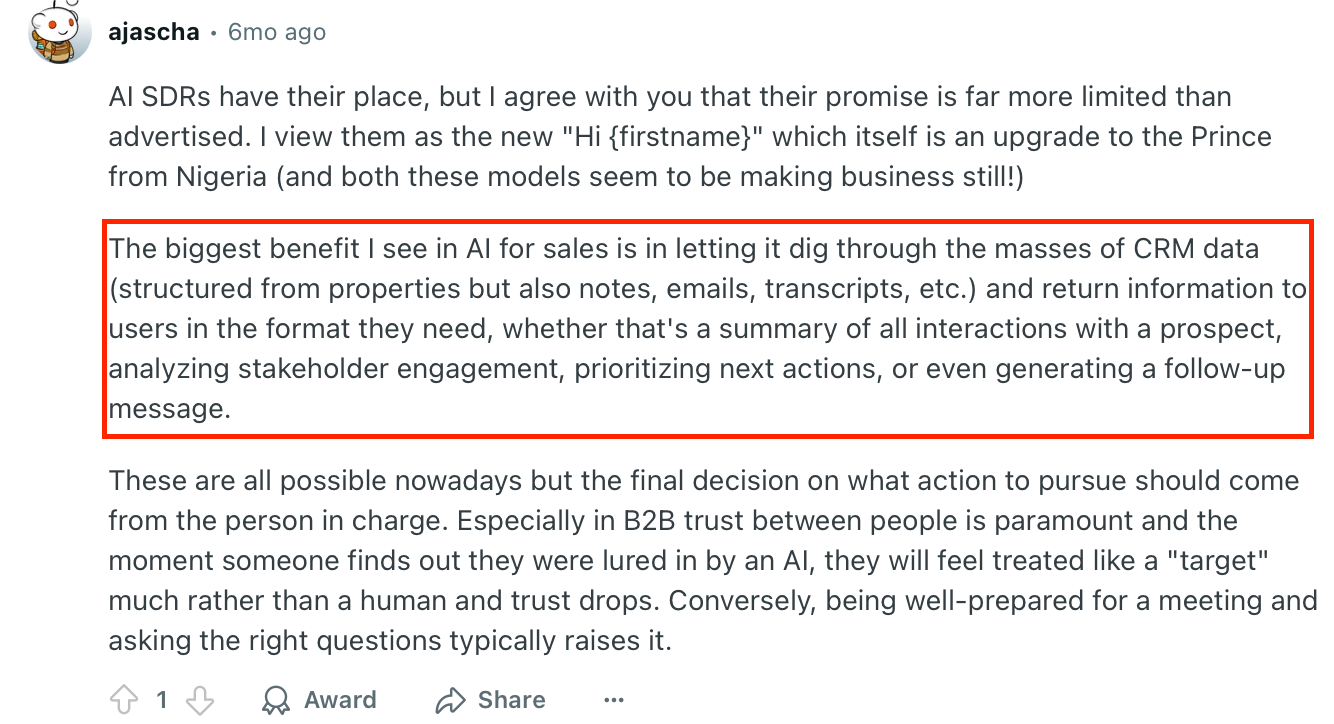
Alt Text: About AI SDR on reddit
This article shows you the 5 best AI SDR tools in 2025.
You’ll see what each one does well, where it struggles, and who should actually use it.
By the end, you’ll know exactly which tool fits your outbound strategy without wasting months testing the wrong software.
Next up, let’s get clear on the basics: what are AI SDR tools, and why do they matter for outbound sales today?
How We Evaluated the Best AI SDR Tools?
To make this list useful, here are the exact criteria we used to evaluate the best AI SDR tools for multi-channel outbound campaigns:
1. Multi-channel support
– Does the tool only send emails, or can it handle LinkedIn, SMS, and calls too?
– Tools that support at least two channels (email + LinkedIn) ranked higher. Full multi-channel (email, LinkedIn, SMS, calls) scored best.
2. Personalization strength
– Does it just merge first names, or can it pull real context (funding, hiring, tech stack, LinkedIn activity) into messages?
– We gave more weight to tools that use AI research to generate custom intros and unique value props.
3. Deliverability features
– This is where most tools fail. If a platform doesn’t offer warm-up, inbox rotation, or spam monitoring, you risk burning your domains.
– Tools with built-in deliverability protection ranked higher than ones that rely only on integrations.
4. Scalability
– Can the tool run multiple inboxes, domains, and users without breaking?
– Solo SDRs don’t need this, but agencies and teams do. We scored higher if the tool made scaling smooth.
5. Pricing transparency
– We favored tools that publish real pricing instead of forcing a “book a demo” wall.
– Bonus points if the pricing scaled fairly with team size, instead of nickel-and-diming for every extra inbox.
By filtering with these criteria, we cut through the noise and narrowed it to the 5 AI SDR tools that actually solve outbound problems in 2025, not just add another subscription to your stack.
Now, let’s move on to the 5 tools.
The 5 Best AI SDR Tools for Multi-Channel Outbound Campaigns
- Salesforge
- Clay
- Artisan AI
- 11x ai
- Jason ais
Quick Comparison of the 5 Best AI SDR Tools
Tool
Best For
Channels Covered
Personalization
Deliverability
Pricing Starts At
Salesforge (Agent Frank)
All-in-one SDR automation with built-in deliverability
Email + LinkedIn ✅
✅ Strong (AI research, tonality, 20+ languages)
✅ Built-in warm-up + rotation (Forge Stack)
$416/month (1,000 contacts, billed annually)
Clay
Data prospecting & enrichment to power outbound
Email + LinkedIn (via integrations) ✅
✅ Strong (AI formulas + ChatGPT prompts)
❌ No built-in deliverability
$134/month (Starter plan)
Artisan AI
Experimenting with AI reps & outbound in one stack
Email + LinkedIn ✅
⚠️ Mixed (waterfall + tone options)
✅ Includes warm-up, monitoring, limits
Custom (contact sales)
11x AI
Testing AI SDRs with email + phone automation
Email + Phone ✅
⚠️ Adaptive personalization (inconsistent)
❌ Limited (no built-in warm-up/rotation)
Custom (contact sales)
Jason AI (Reply.io)
AI + multichannel in one engagement platform
Email + LinkedIn ✅
✅ Good (AI writing assistant)
✅ Warm-up + mailbox health included
$800/month (Starter plan)
#1. Salesforge – Agent Frank (Best Overall AI SDR for Multi-Channel + Deliverability)
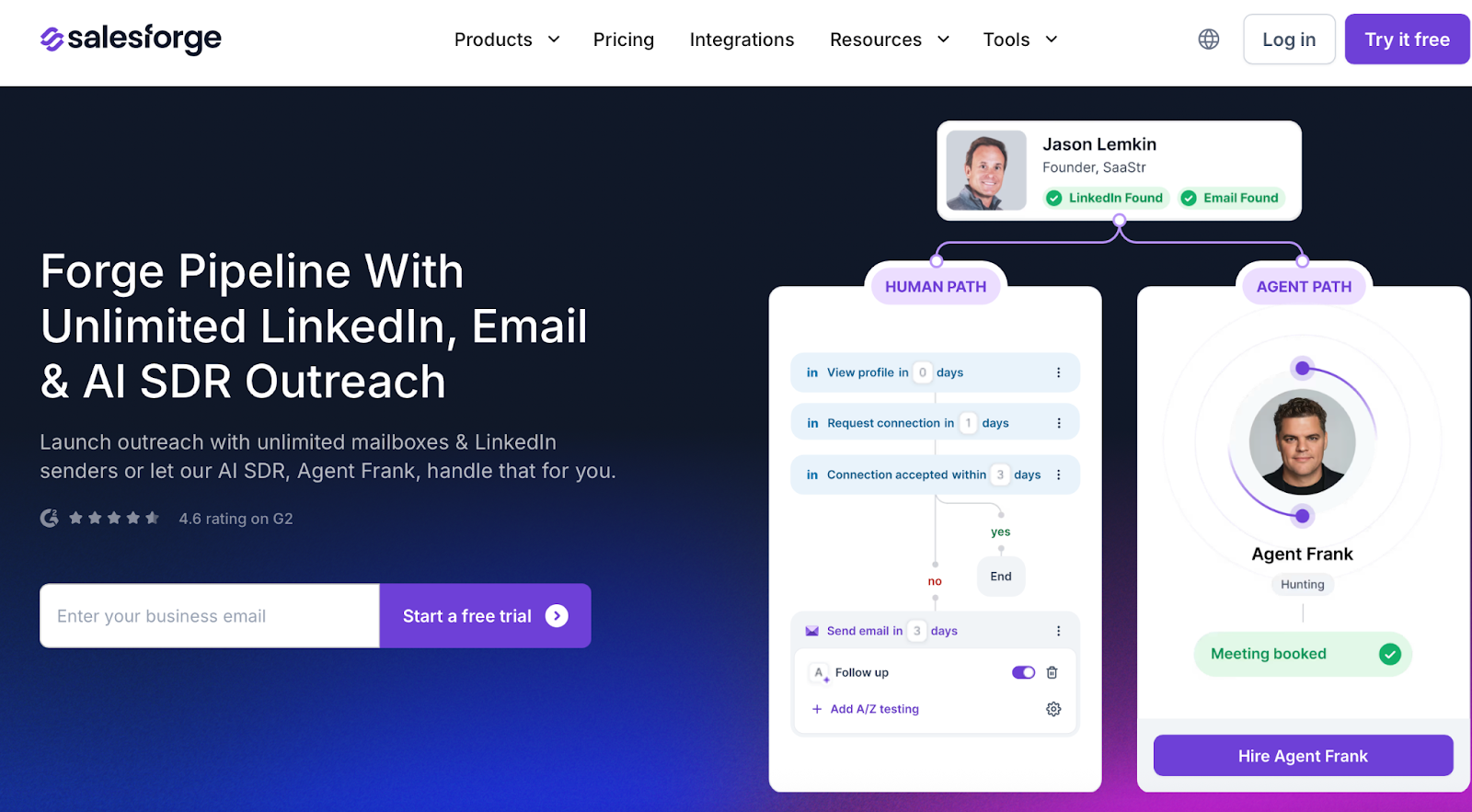
Alt Text: Salesforge Homepage
If you want one tool that covers multi-channel outbound + personalization + deliverability, Salesforge’s Agent Frank is the strongest option in 2025.
It is built to replace the manual work of an SDR and run outbound campaigns that actually get replies.
Also Read: BDR vs SDR: Which is better in 2025?
How Agent Frank Works?
Agent Frank is an AI SDR agent that runs on autopilot. Once set up, he can handle the full outbound workflow:
- Finding and enriching leads through Leadsforge.
- Personalizing outreach in 20+ languages using your knowledge base and chosen tonality.
- Sequencing campaigns across email, LinkedIn, SMS, and calls.
- Booking meetings directly while you focus on closing deals.
Unlike many AI SDR tools, Frank doesn’t need external providers.
AI Agent Frank explained | AI SDR By Salesforge
He connects with the Forge Stack: Mailforge and Infraforge for email infrastructure, Warmforge for warm-up, and Leadsforge for data.
That means you manage everything in one platform without extra subscriptions.
Everything is managed inside Salesforge, so you don’t need extra tools for infrastructure, warming, or deliverability.
1. Multi-channel support
Agent Frank runs outreach through email and LinkedIn.
This checks the highest box for multi-channel support.
2. Personalization strength
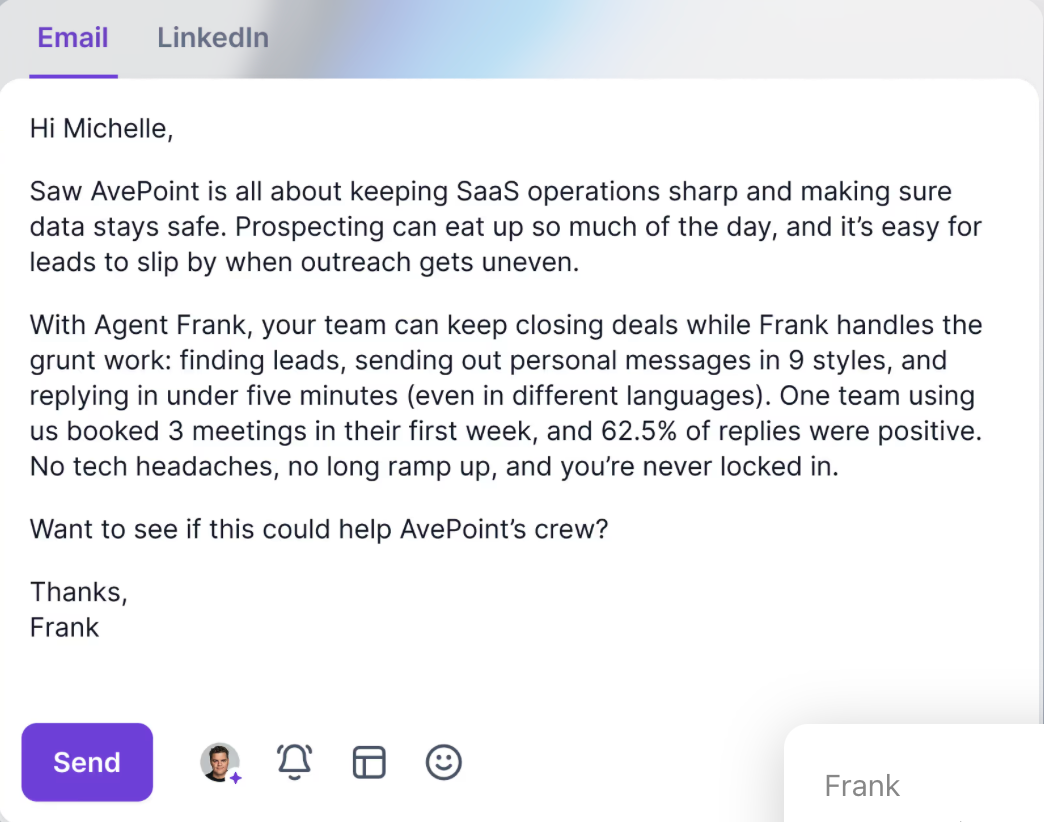
Alt Text: Personalisation in Agent Frank
He can create personalized intros using AI research, your uploaded documents, and website content.
You also control tonality, goals, and availability, making it flexible for different markets.
3. Deliverability features
This is where Frank stands out.
With warm-up, mailbox rotation, DKIM/SPF/DMARC setup, and reputation monitoring handled inside Salesforge + Forge Stack, you get built-in deliverability protection.
Also Read: How to Segment Email Lists for Better Deliverability
4. Scalability
Pricing is based on active contacts instead of users or mailboxes.
That makes scaling predictable, and processes more contacts without hidden costs.
Agencies and teams can connect unlimited mailboxes, while solopreneurs can start small.
5. Pricing transparency

Alt text: Agent Frank Pricing
- Agent Frank plan: starts at $416/month (billed annually) for up to 1,000 active contacts (~$0.25 per contact).
- Includes: 24/7 prospecting, multi-channel outreach, customization, 500M+ contact search engine, dedicated account manager, and shared Slack support.
- Add-ons: email infrastructure if you don’t want to bring your own.
Compared to a traditional SDR ($8,000/month with salary + tools), Agent Frank offers a 16x cost reduction while still building a pipeline.
Pros and Cons of Agent Frank
Pros
Cons
Fully managed AI SDR: finds leads, personalizes outreach, and books meetings.
Requires a demo to get started, not instant self-serve.
Built-in deliverability: warm-up, inbox rotation, infrastructure via Forge Stack.
Initial setup needed (mailboxes, domain records, knowledge base).
Highly customizable: language, tonality, goals, autopilot vs. co-pilot.
Cost can rise with very large contact volumes (pricing per active contact).
Cost-efficient compared to a human SDR ($499+ vs. ~$8,000/month).
Learning curve to optimize customization for best performance.
Dedicated account manager + shared Slack support channel.
Limited to email and LinkedIn as main outbound channels.
Who Is Agent Frank For?
Segment
Best Fit If You...
Startups / Small Teams
want an AI SDR that saves hiring costs and manages deliverability out of the box.
Agencies
run outbound for clients and need one platform for leads, outreach, and deliverability.
Scaling Companies
need predictable pricing per active contact while handling thousands of leads monthly.
Sales Teams
prefer focusing on closing deals while the AI agent manages prospecting and follow-up
In short,
If you want one AI SDR that handles prospecting, personalization, sequencing, and deliverability in a single stack, Agent Frank by Salesforge is the best pick.
He’s designed for both solo reps who want automation and teams or agencies who need to scale without hiring more SDRs.
#2 Clay – Best AI SDR Tool for Data Prospecting + Personalization
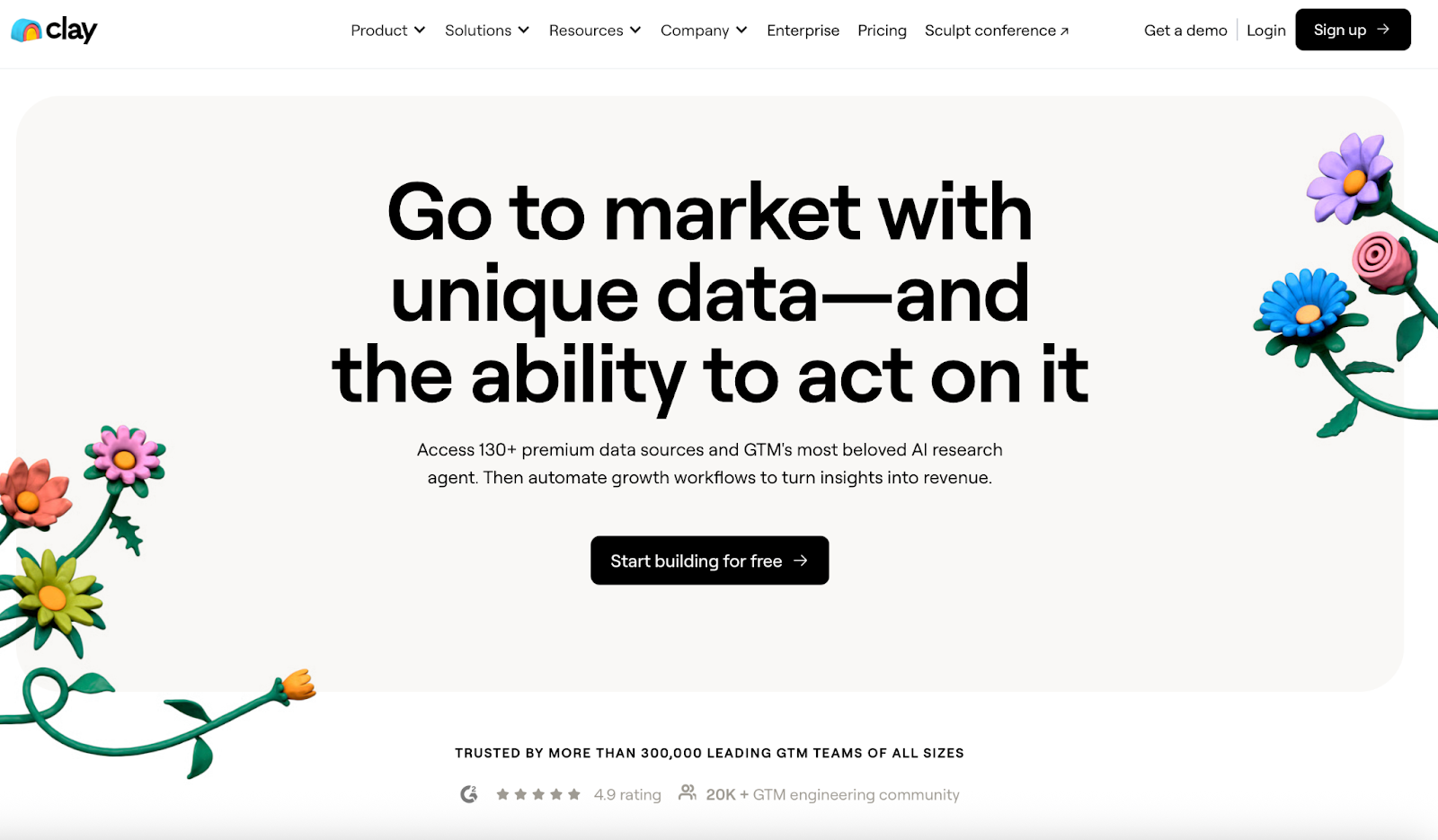
Alt Text: Clay Homepage
Clay has built its reputation as one of the most flexible AI SDR tools for multi-channel outbound campaigns, mainly because of how strong it is on the data side.
Instead of just sequencing emails, Clay focuses on giving you the right leads with the right enrichment, so your campaigns have a stronger foundation.
What Clay Does
Clay acts like a data engine for outbound sales.
It connects to 100+ data providers, enriches company and contact details, verifies emails, and even integrates with AI (like ChatGPT) to draft personalized outreach.
With Clay, you can:
- Build prospecting lists based on your ICP.
- Automate enrichment workflows with triggers (funding rounds, new hires, tech stack changes).
- Use AI prompting to generate first-touch emails or LinkedIn intros.
- Score and prioritize leads with enrichment data before pushing them into your outbound campaigns.
Multi-Channel Support
Clay itself is not an outreach platform. Instead, it feeds data and personalization into other tools.
Email and LinkedIn are the main channels supported through integrations.
If your outbound depends on clean, enriched data before you launch campaigns, Clay is often the first step in the stack.
Personalization Strength
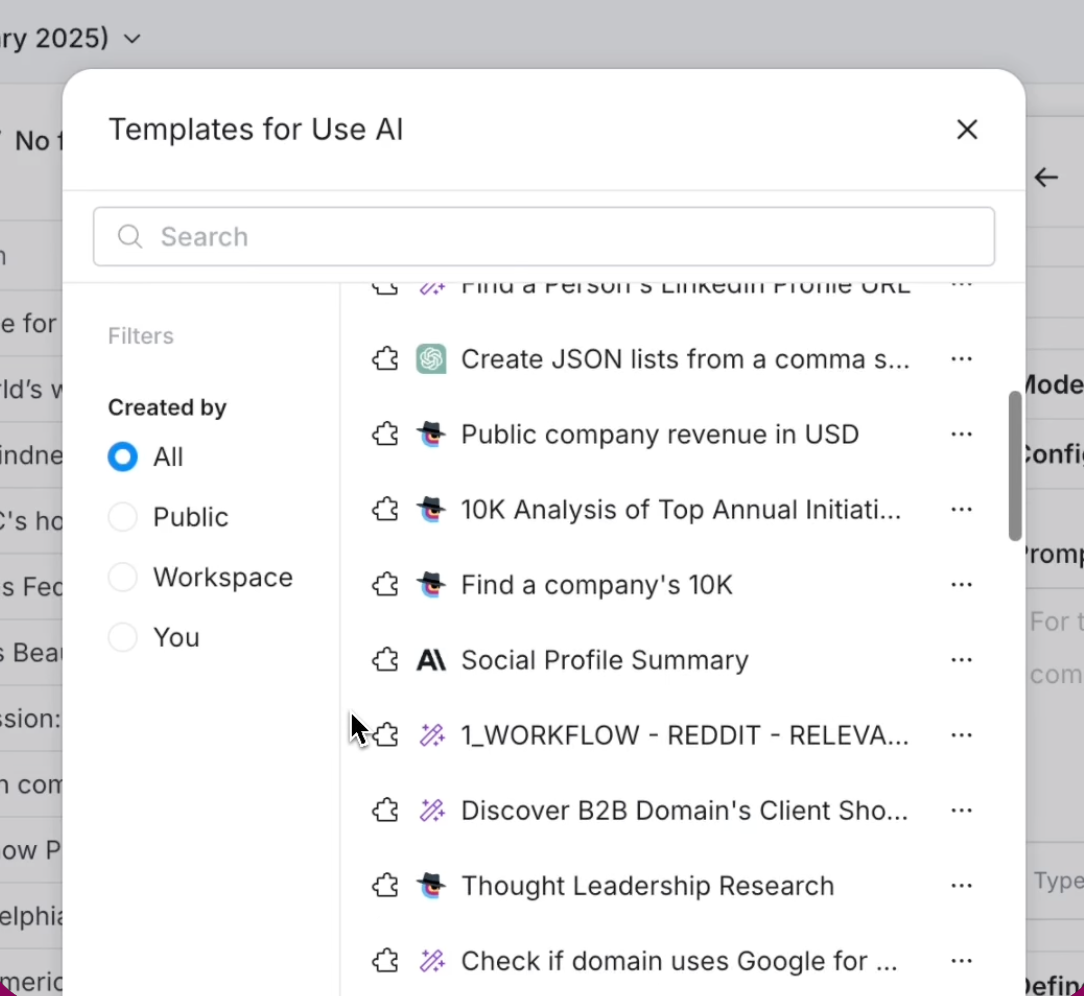
Alt Text: Clay personalization AI templates
Clay is strongest here.
With AI formulas and integrations with ChatGPT, users can set up prompts that generate unique, context outreach.
For example, Clay can pull a company’s latest funding round and automatically create an email intro that references it.
Deliverability Features
Clay does not handle email warm-up, inbox rotation, or deliverability monitoring.
You’ll need to connect it with a deliverability-first tool to avoid emails bouncing or landing in spam.
This is where Clay falls short compared to all-in-one SDR tools.
Scalability
Clay is built for scale.
Its credit-based pricing lets you start small and grow without committing to expensive plans upfront.
You can run thousands of data enrichments and feed them into your outbound system.
The downside: there’s a steep learning curve, and building workflows requires time and technical know-how.

Alt Text: Clay G2 reviews
Pricing Transparency
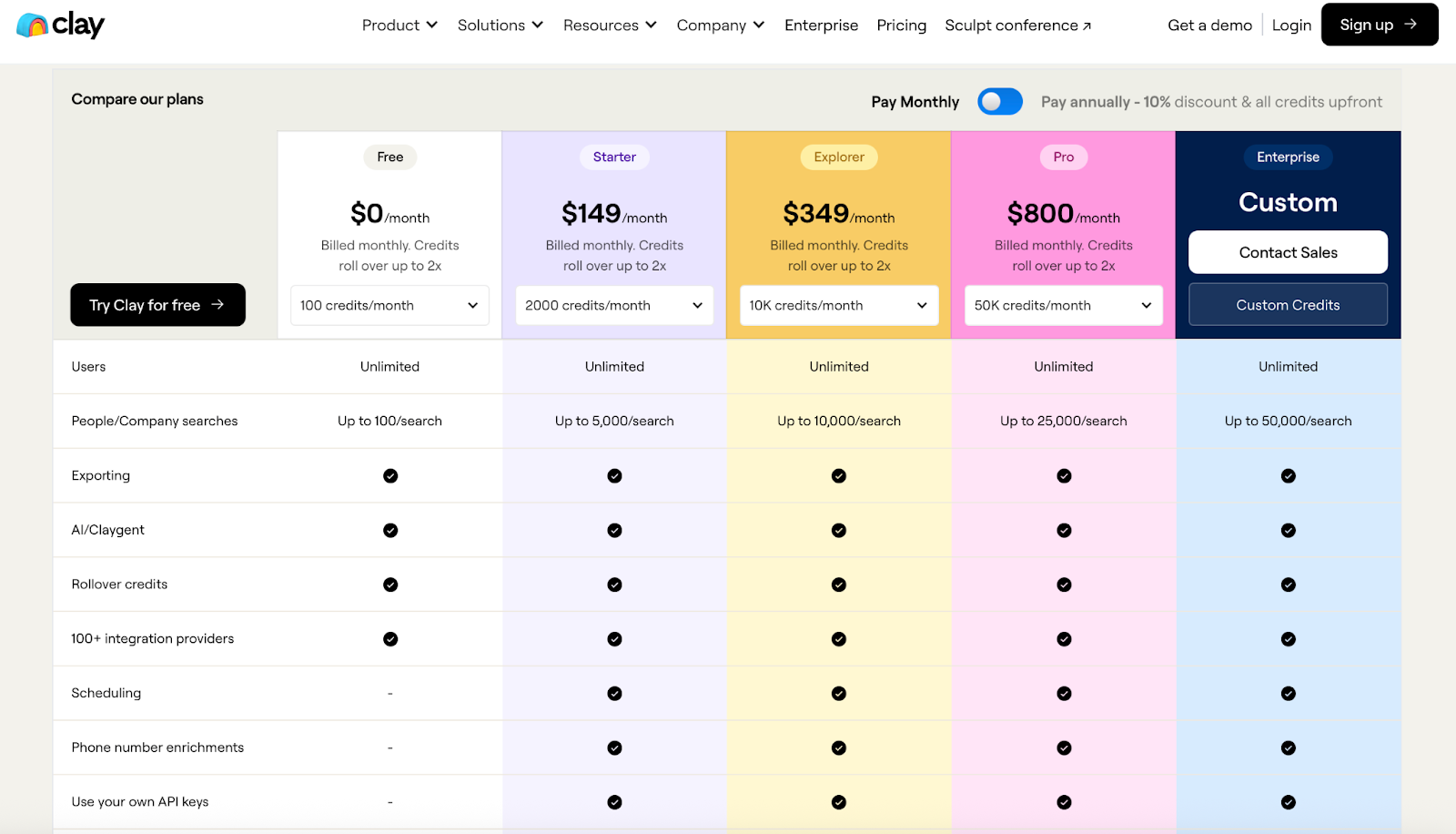
Alt Text: Clay Pricing
Clay offers flexible, credit-based pricing:
- Starter: $134/month
- Explorer: $314/month
- Pro: $720/month
- Enterprise: custom
Pricing depends on how many credits you need for enrichment and automation.
For smaller teams, it can feel expensive compared to other simpler tools.

Alt Text: Clay G2 reviews
Pros and Cons of Clay
Pros
Cons
Strong data enrichment: access to 100+ providers for company and contact info.
Steep learning curve, requires technical setup to unlock full value.
AI integration with ChatGPT for writing personalized email intros.
Expensive for smaller teams compared to alternatives like Apollo.
Flexible workflows: automate triggers (funding, hiring, tech stack).
Mixed reviews on data accuracy (some users reported errors).
Credit-based pricing: pay only for what you use.
Doesn’t handle email deliverability or campaign execution.
Scales easily with enterprise-level data operations.
Can be overwhelming for non-technical users or small teams.
Who Is Clay For?
Segment
Best Fit If You...
Sales Ops / GTM Teams
want to enrich data, run workflows, and experiment with outbound triggers.
Data-Driven Outbound Teams
prioritize accurate lead scoring and personalization before outreach.
SMBs with budget
are okay paying for credits in exchange for flexible enrichment at scale.
Teams with existing outreach tools
already use another platform for sending emails/LinkedIn and just need clean, enriched data.
In short,
Clay is not the tool that runs your outbound campaigns, it’s the tool that makes sure your campaigns start with accurate, enriched, and personalized data.
If you want an AI SDR tool that excels at prospecting and personalization, Clay is a solid choice.
But for teams looking for built-in deliverability and campaign execution, you’ll need to combine Clay with another outbound platform.
Also Read: 7 Best Clay Alternatives & Competitors for Automated Outreach
#3 Artisan AI – High Hype, Mixed Results
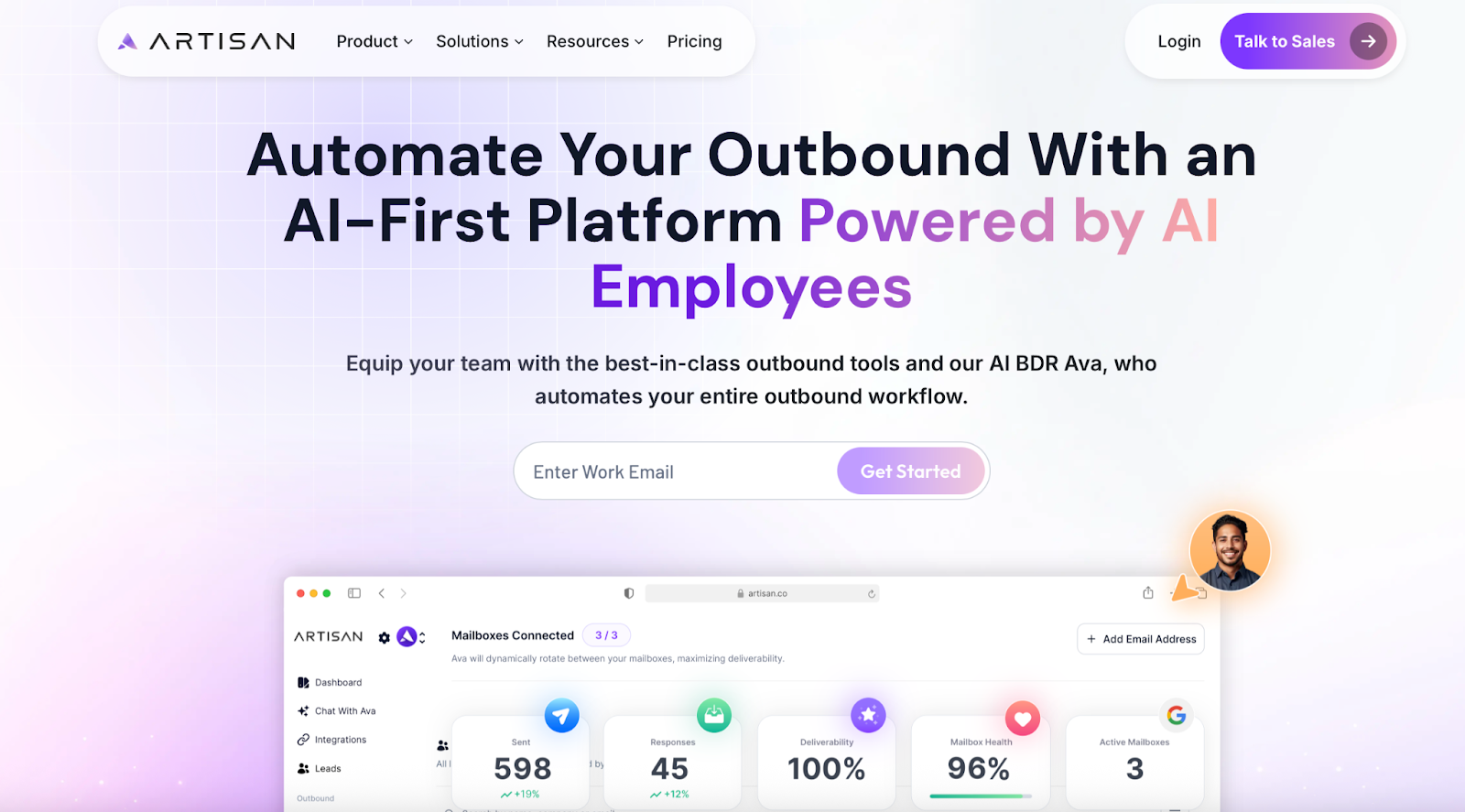
Alt Text: Artisan AI Homepage
Artisan AI made headlines with bold marketing campaigns like the “Stop Hiring Humans” billboard.
The attention worked, but it also raised ethical concerns and created backlash.
Beyond the noise, their core product is an AI-powered SDR platform with a flagship agent called Ava, designed to act as an AI BDR.
How ARTISAN CO (stop hiring humans app) actually works?
What Artisan AI Does
Artisan offers a full outbound stack with:
- Lead discovery: access to 300M+ B2B contacts with filters for industry, funding, hiring, and even e-commerce signals.
- Data enrichment: scrapes LinkedIn and X (Twitter) posts, company news, technographics, and hiring activity.
- Personalized outreach: uses LLMs to draft emails and LinkedIn messages with multiple tones, CTAs, and personalization layers.
- Deliverability tools: includes warmup, mailbox monitoring, signature rotation, and dynamic sending limits.
- AI agent Ava: positioned as “10x more productive than a human SDR,” capable of writing and sending personalized emails at scale.
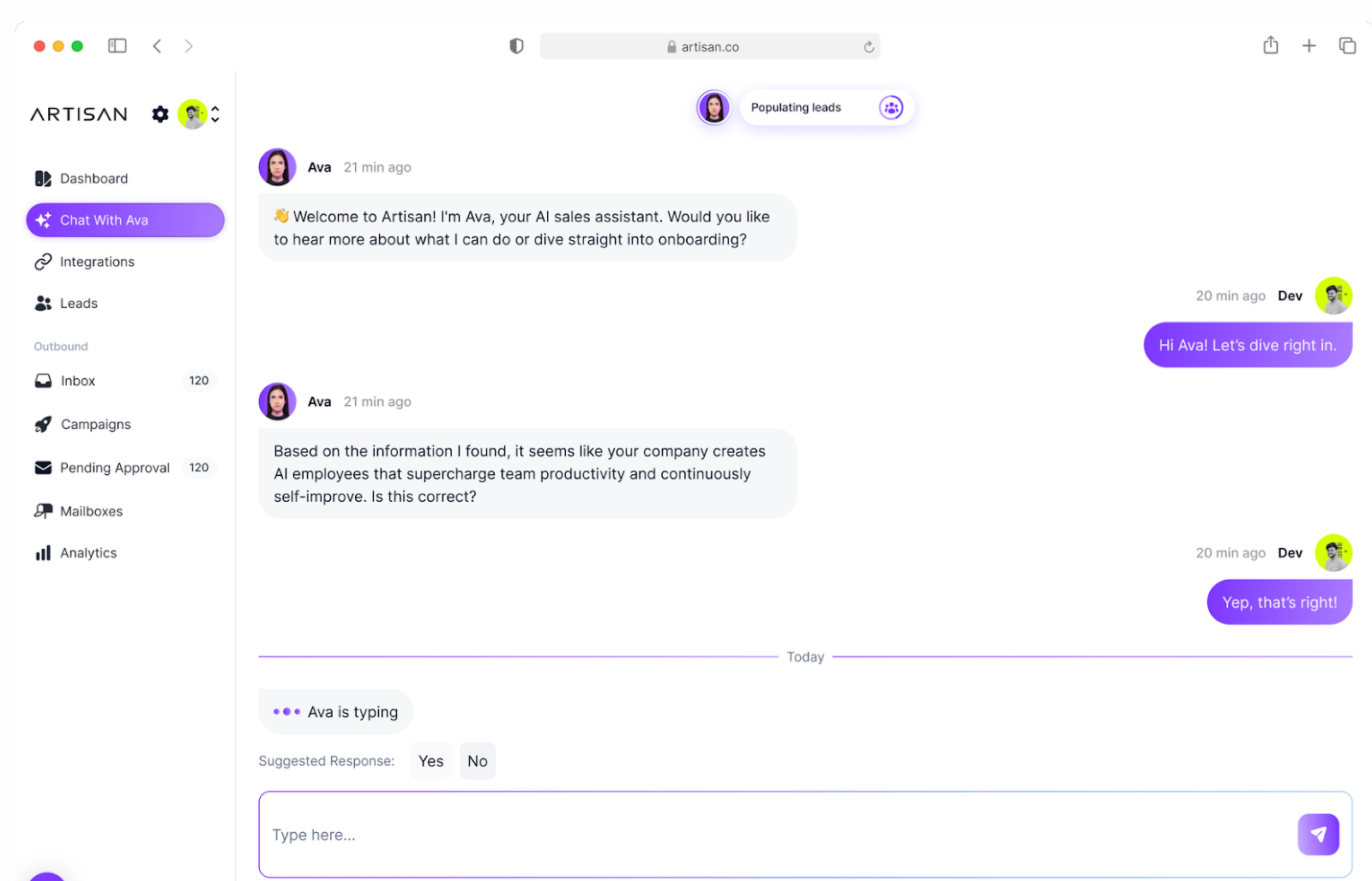
Alt Text: Artisan AI chat with Ava
Multi-Channel Support
Artisan covers both email and LinkedIn outreach, offering automated connection requests, message sequences, and analytics.
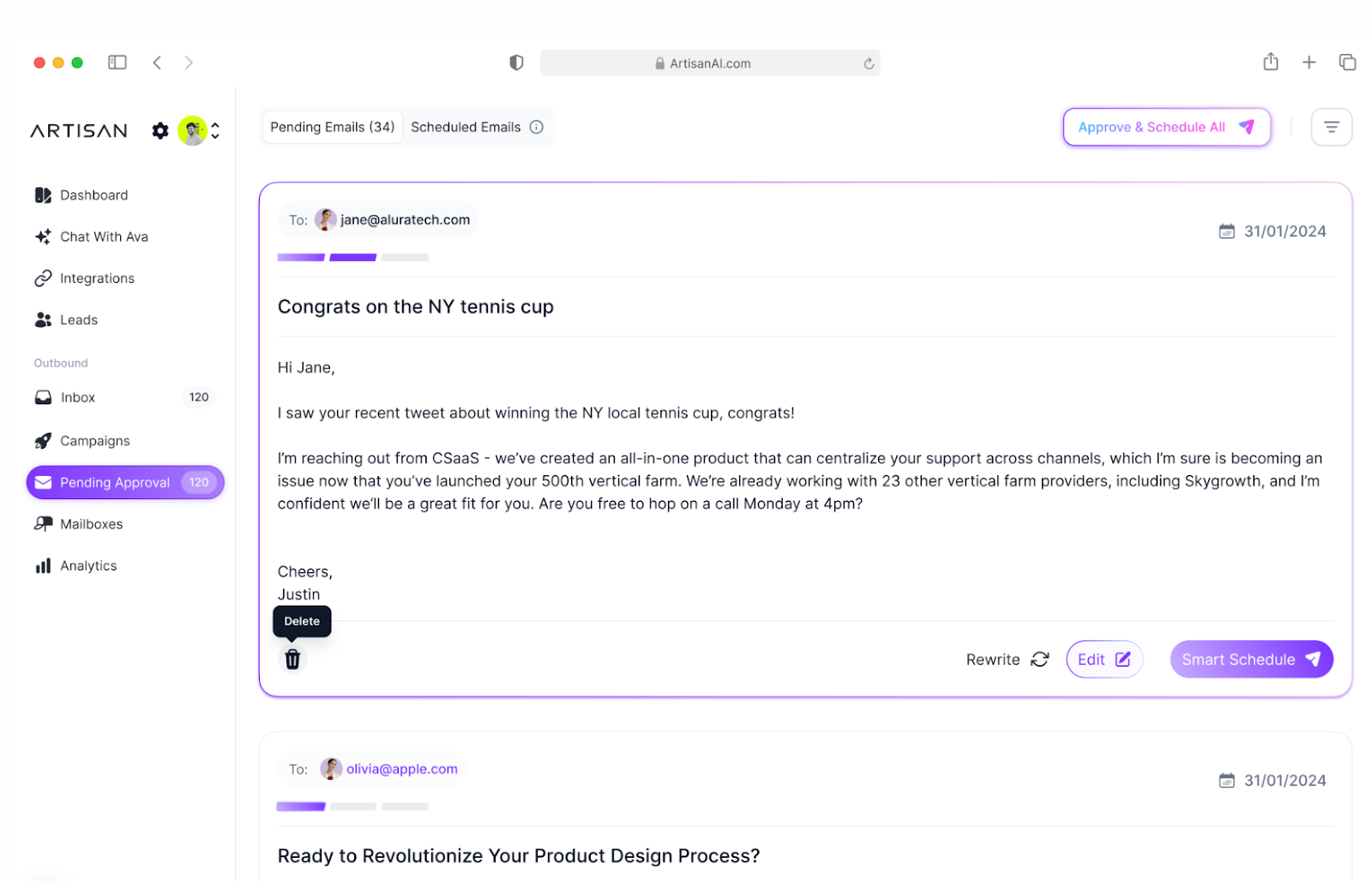
Alt Text: Emails in Artisan AI
These channels match what most B2B outbound teams rely on today.
Personalization Strength
The platform uses a “personalization waterfall,” which applies the best available data to craft unique messages.
It can adjust tone, insert dynamic CTAs, and personalize both emails and LinkedIn messages.
However, user reviews are mixed, some say the emails feel generic despite the AI features.
Deliverability Features
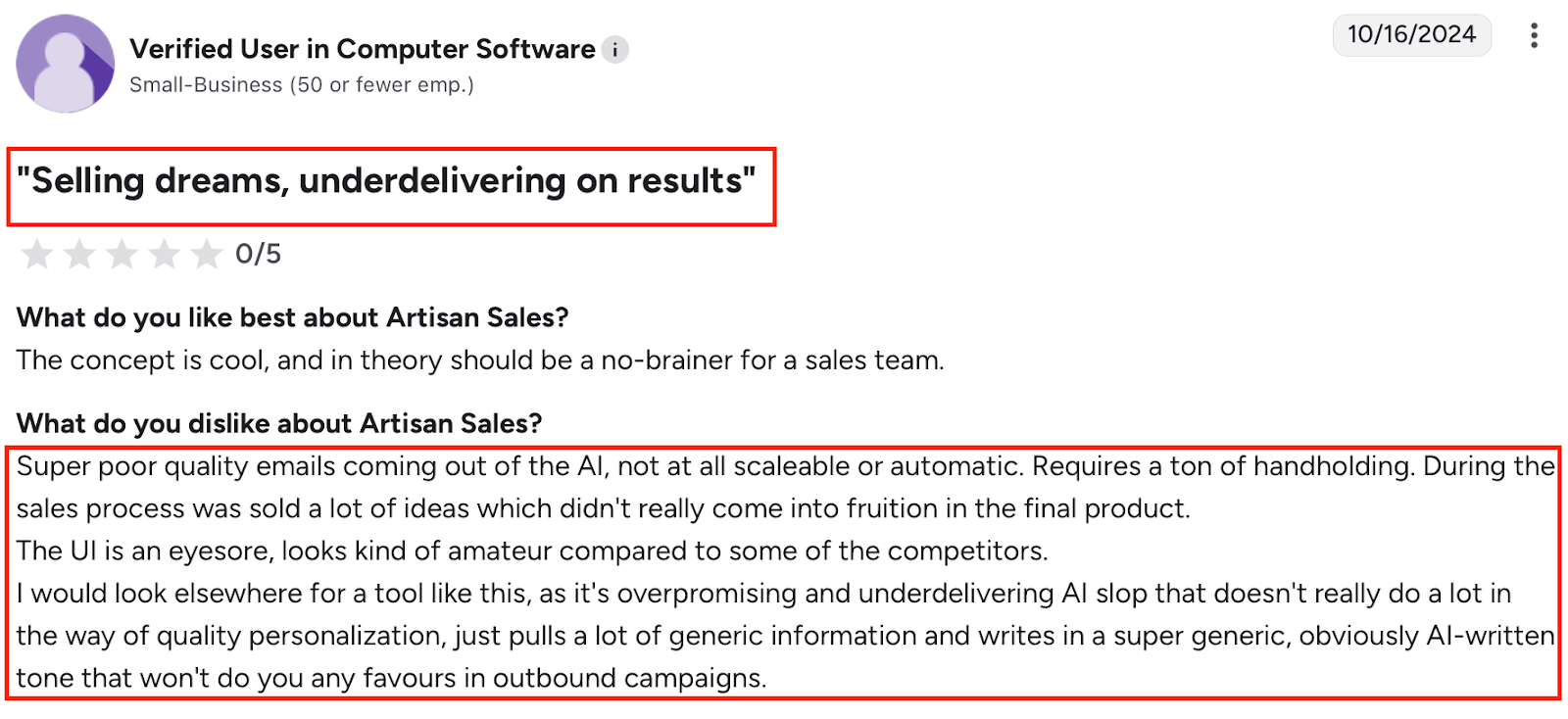
ALt Text: Artisan AI G2 reviews
Artisan includes warmup, dynamic sending limits, placement monitoring, and signature rotation.
On paper, these protections should help keep inbox placement strong.
But churn rates reported by users suggest that performance hasn’t matched expectations for many.
Scalability
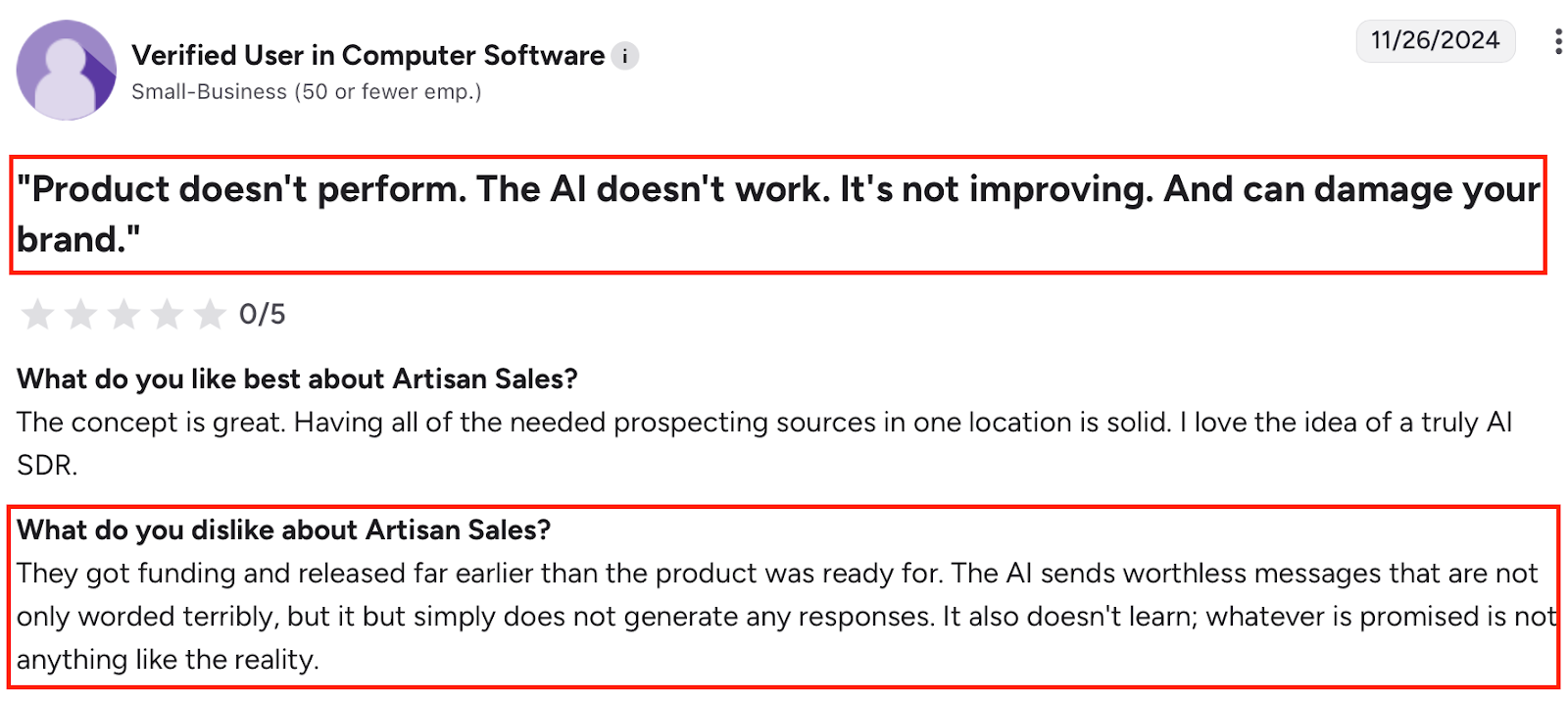
ALt Text: Artisan AI G2 reviews
The company claims Ava is “10x more productive than a human,” but reviews show high churn rates (80%+) which raises questions about scalability in real-world use.
While the database and workflows can scale, reliability and campaign results seem inconsistent.
Pricing Transparency
Artisan doesn’t publish standard pricing.
Costs depend on lead volume and are customized by sales.
While this can work for enterprises, smaller teams may find it hard to gauge ROI before committing.

ALt Text: Artisan AI G2 reviews
Pros and Cons of Artisan AI
Pros
Cons
Full outbound stack: lead discovery, enrichment, outreach, and deliverability in one platform.
Mixed reviews: many users found campaigns underwhelming with few replies.
Covers email + LinkedIn outreach with personalization waterfall and multiple tone options.
Extremely high churn rate (reported at 80%+) suggests low long-term satisfaction.
Built-in deliverability tools: warmup, monitoring, signature rotation, sending limits.
Generic message quality: some users say AI-generated emails lack real impact.
Large B2B database (300M+ contacts) with detailed filters.
Pricing is not transparent; you must talk to sales to get a quote.
Bold marketing brought visibility and investor attention.
Marketing controversies and ethical concerns damaged brand reputation.
Who Is Artisan AI For?
Segment
Best Fit If You...
Enterprises exploring AI outbound
want an all-in-one platform that combines leads, outreach, and deliverability in one system.
Teams experimenting with AI SDRs
are curious about using AI reps like Ava to automate top-of-funnel outreach.
Companies with budget flexibility
can handle custom pricing and want to test new AI-driven workflows.
Early adopters of AI tech
are willing to tolerate mixed results in exchange for trying cutting-edge AI SDR tools.
In short,
Artisan AI has built a lot of buzz, and its outbound feature set looks strong on paper, lead data, enrichment, personalization, and deliverability in one platform.
But user feedback is mixed: some found the tool underwhelming, while others point to high churn and generic outputs.
Artisan may be worth exploring for teams curious about AI-driven outbound, but results can vary, and smaller businesses may struggle with pricing and setup.
Also Read: 3 Tested Artisan AI Alternatives For Email Outreach in 2025
#4 11x AI – Mixed Performance in Outbound Campaigns
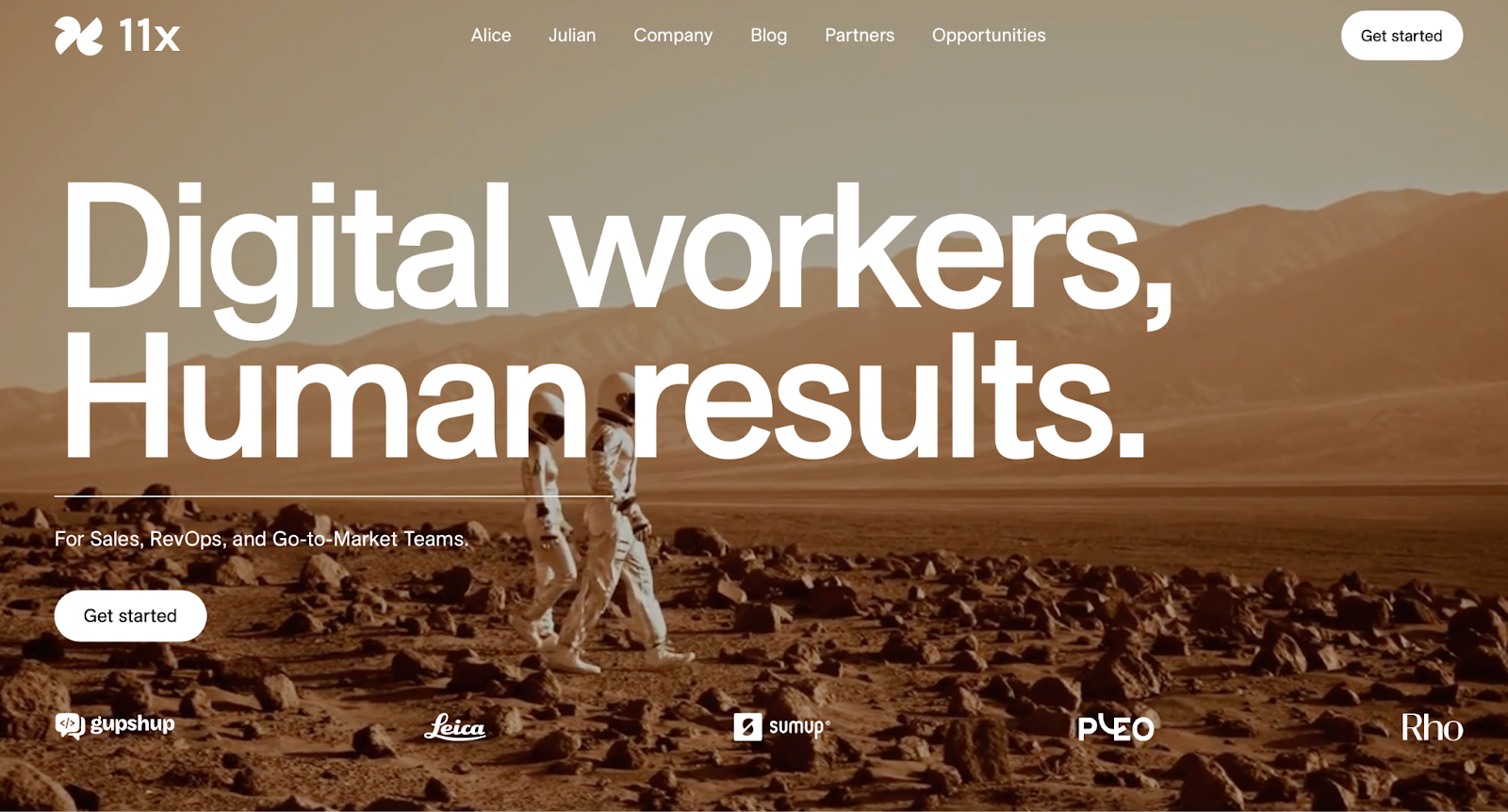
Alt Text: 11x.ai Homepage
11x AI is positioned as an AI-powered SDR platform with “digital workers” like Alice (AI SDR) and Julian (AI Phone Agent).
These agents are designed to handle prospecting, personalization, outreach, and even phone conversations on autopilot.

Alt Text: 11x.ai Dashboard
But while the marketing is strong, real-world feedback from users shows mixed results, especially around consistency and scale.
What 11x AI Does?
- Lead sourcing: identifies prospects and surfaces opportunities across channels.
- AI SDR – Alice: automates outreach, engages prospects, and books meetings.
- AI Phone Agent – Julian: conducts calls, adapts conversations in real time, and retargets old leads.
- Personalization: adapts tone and messaging dynamically to match a prospect’s style.
- Integrations: designed to embed with existing workflows for RevOps and sales teams.
11x.ai Demo | Full step-by-step Alice AI SDR tutorial [2024]
Multi-Channel Support
11x AI covers email + phone through Alice and Julian.
While it positions itself as multi-channel, LinkedIn outreach is not highlighted as strongly as in other tools.
This makes it more focused on email + calling workflows.
Personalization Strength
The platform emphasizes adaptive personalization, where AI learns from interactions and adjusts messaging.
In theory, this makes conversations more “human-like.”
Some users reported success, booking meetings through Alice’s outreach.
But others found the personalization lacking depth compared to tools like Clay.
Deliverability Features
Unlike Salesforge, 11x AI doesn’t highlight warm-up, inbox rotation, or domain reputation monitoring as built-in features.
This means deliverability depends heavily on your setup and infrastructure, which could explain why some users experienced inconsistent campaign results.
Scalability
This is where reviews are split:
- Some users ran 11x for months and got consistent meetings.
- Others said performance was slow, inconsistent, or limited (for example, being tied to one email account).
- High churn rates (reported around 70%) suggest many teams struggled to scale campaigns long term.
Pricing Transparency
11x AI does not publish pricing publicly. All pricing is custom and requires contacting sales. This makes it harder for small teams to evaluate ROI before committing.

Alt Text: 11x.ai reddit reviews
Pros and Cons of 11x ai
Pros
Cons
AI SDR “Alice” for automated outreach and booking meetings.
Inconsistent results: some weeks many meetings, others very few.
AI Phone Agent “Julian” adds voice calls as a channel.
High churn rate (around 70%) shows low long-term satisfaction.
Adaptive personalization that adjusts tone and style.
Limited features: some users reported only being able to use one email account.
Can help retarget old leads through calls and follow-ups.
Performance can be slow and unreliable (reported in some regions).
Good fit for experimenting with AI-driven outbound workflows.
No published pricing, must contact sales; harder for small teams to evaluate ROI.
Who Is 11x ai For?
Segment
Best Fit If You...
Enterprises testing AI SDRs
want to experiment with digital workers that cover email + phone outreach.
Teams with high lead volume
need automation to retarget old or cold leads that humans can’t get to.
Companies with budget flexibility
can handle custom pricing and are open to testing new AI tech despite mixed reviews.
Early adopters
want to be among the first to try fully autonomous SDRs, even if results aren’t always predictable.
In short,
11x AI offers a bold pitch: fully autonomous SDRs that work 24/7 through email and phone.
Some users have seen success sourcing meetings, but others report inconsistent results, slow performance, and limited features.
With its high churn rate, it’s a tool better suited for teams willing to experiment with AI SDRs, but not for businesses looking for predictable, proven performance.
#5 Jason AI (Reply.io) – AI Inside a Sales Engagement Platform
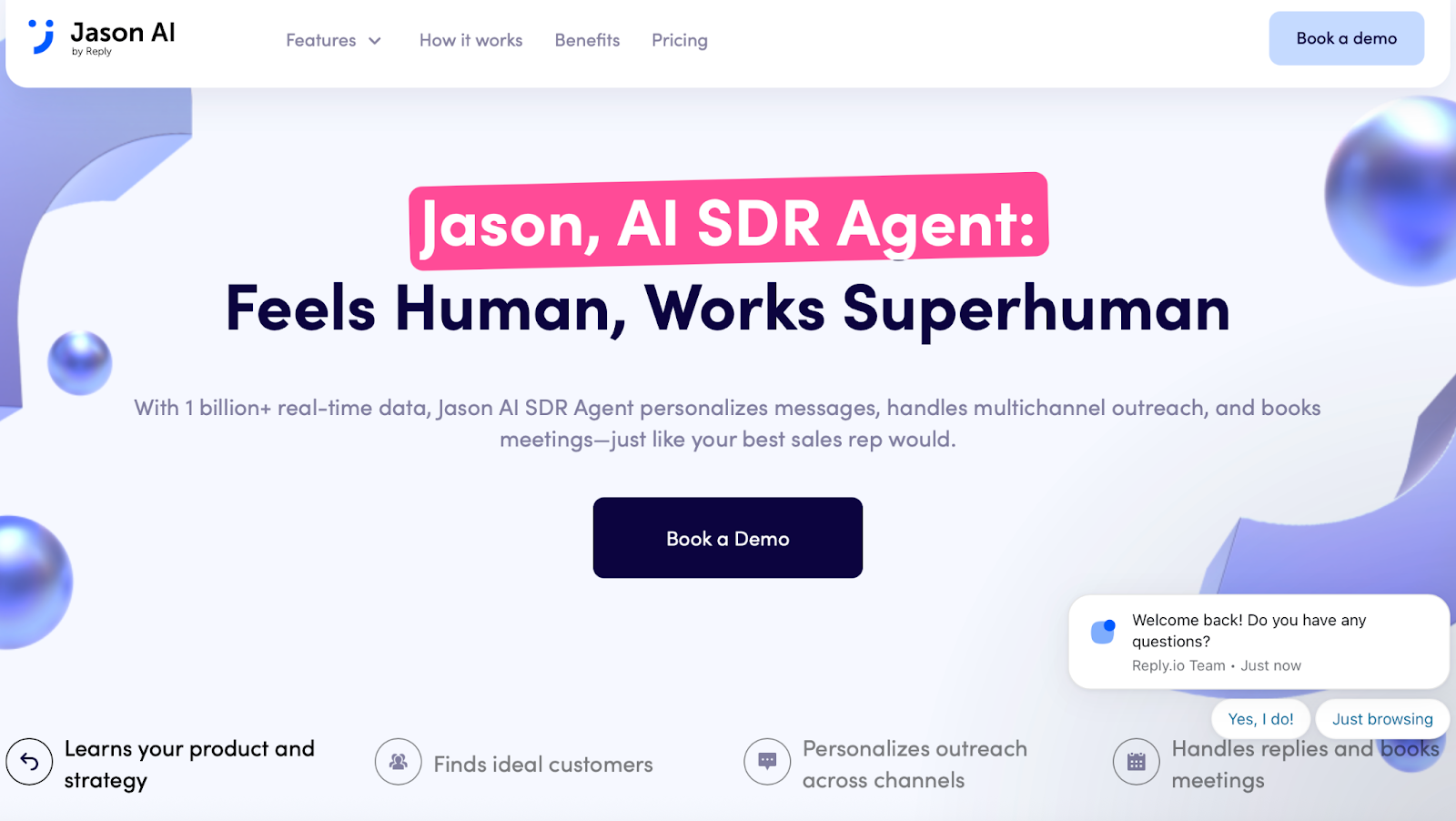
Alt Text: Jason AI Homepage
Jason AI is the AI-powered SDR built inside Reply.io, a well-known sales engagement platform.
Unlike some standalone AI SDR tools, Jason AI is part of a broader platform that already includes multichannel outreach, deliverability, and LinkedIn automation.

Alt Text: Jason AI by Reply.io G2 reviews
What Jason AI Does
- AI writing assistant: generates personalized email and LinkedIn messages for outreach campaigns.
- Multichannel automation: combines email + LinkedIn into one sequence.
- Deliverability tools: includes unlimited warm-ups, mailbox health, and monitoring.
- Autopilot & copilot modes: run campaigns fully automated or with human oversight.
- Custom playbooks & onboarding: higher plans include white-glove onboarding, Slack support, and strategy sessions.
Multi-Channel Support
Jason AI supports email + LinkedIn outreach natively, giving users two of the strongest outbound channels in one place.
It doesn’t highlight SMS or phone calls, so it’s more limited compared to tools that include calling agents.
Personalization Strength
The AI assistant is praised for generating outreach copy quickly, adapting tone, and supporting multichannel sequences.
Users say it’s easy to use compared to other platforms.
However, some found the copy generic when compared to more advanced personalization engines.
Deliverability Features
Reply.io includes unlimited warm-up, mailbox rotation, and deliverability monitoring in its packages.
Still, some users expressed doubts about how strong the deliverability protections are compared to dedicated tools.
Scalability
Jason AI scales with active contacts:
- Starter Plan: $800/month → 1,000 active contacts
- Growth Plan: $2,500/month → 5,000 active contacts
- Enterprise Plan: custom → up to 25,000 contacts
All tiers allow unlimited users, unlimited mailboxes, and full access to features.
The downside is the high entry price point, which may not suit smaller teams.
Pricing Transparency
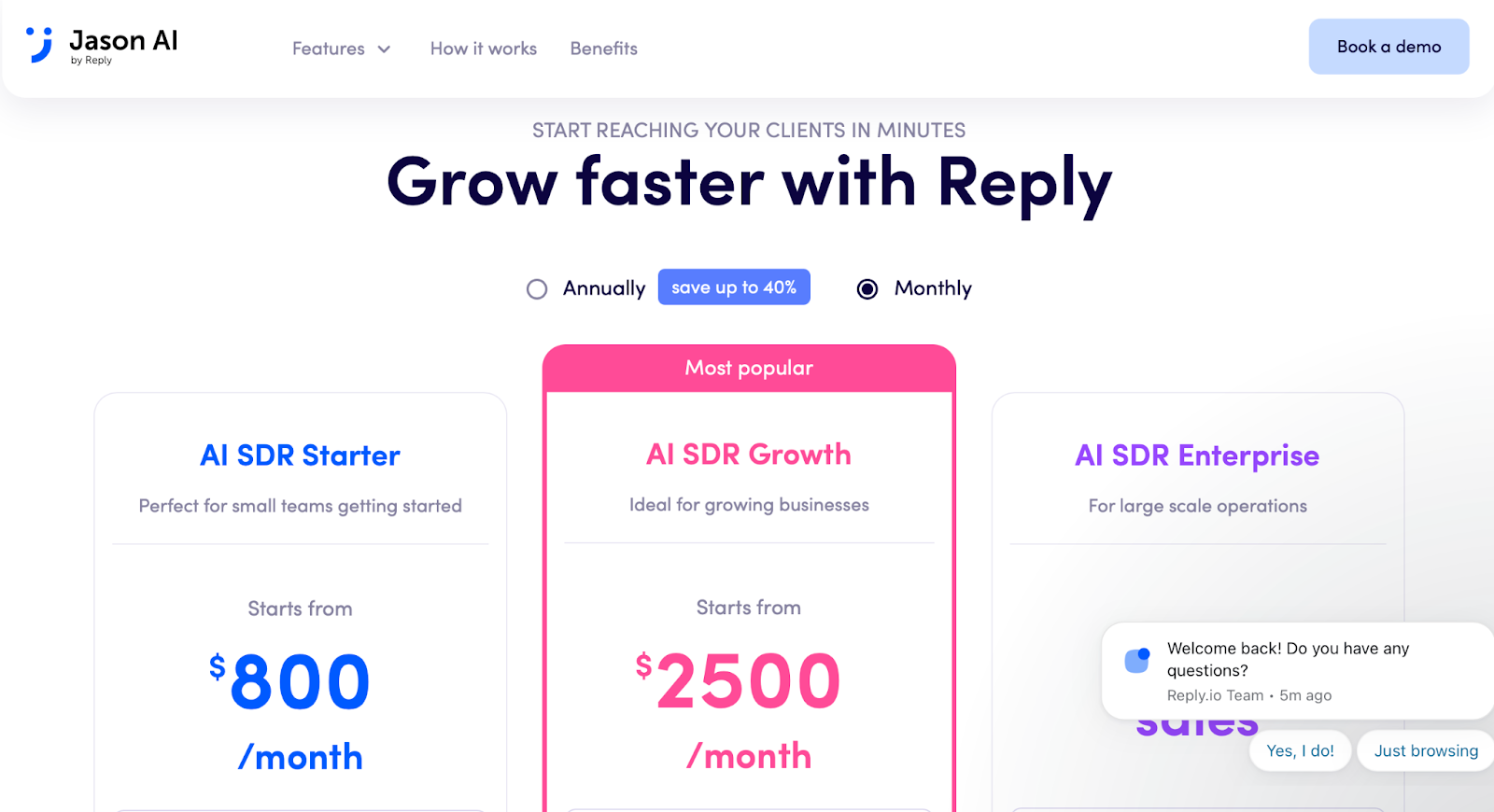
Alt Text: Jason AI Pricing
Unlike many AI SDR vendors, Reply.io publishes clear pricing on its site.
While transparent, the plans start at $800/month, making it more of a fit for funded startups or larger teams.
Pros and Cons of Jason ai
Pros
Cons
Strong AI writing assistant and support for multichannel sequences (email + LinkedIn).
Some users report weak deliverability or concern around inbox placement.
Very user-friendly; easier to use than many other complex SDR tools.
High cost relative to smaller tools; starts at ~$800/month.
Includes built-in deliverability tools: warmups, mailbox health, unlimited mailboxes.
May feel generic personalization compared to tools specialized in deep data enrichment.
Clear pricing tiers published publicly.
Not much information on phone or SMS channels; mostly email + LinkedIn.
Autopilot & co-pilot modes give flexibility for automation vs oversight.
Some users believe that email outreach in general has low response rates, reducing ROI.
Who Is Jason ai For?
Segment
Best Fit If You...
Growing Startups / SMBs
want a polished tool with good multichannel outreach + deliverability, and you can invest from ~$800/month.
Teams already using Reply.io or similar engagement tools
want to leverage built-in AI for personalization without adding more tools.
Businesses with enough budget and process maturity
can pay for higher contact volumes and want white-glove onboarding and custom playbooks.
Sales teams focused on email + LinkedIn
rather than phone or SMS outreach, and want a tool that’s easy to use.
In short,
Jason AI by Reply.io is a solid choice if you want AI + multichannel automation + deliverability tools in one sales engagement platform.
It’s user-friendly, well-integrated, and transparent on pricing.
The trade-offs are cost and the fact that personalization and deliverability aren’t as advanced as some specialized competitors.
For teams already using Reply.io, Jason AI is a natural upgrade.
Alt Text: 5 Best Jason AI Alternatives & Competitors for AI Sales Outreach
Final Say
Alright, quick game before we wrap up.
Question 1: Which tool is best if you only need data prospecting?
👉 Answer: Clay.
Question 2: Which one had flashy marketing but mixed results in practice?
👉 Answer: Artisan AI.
Question 3: Which tool adds phone calls into the mix but struggles with consistency?
👉 Answer: 11x AI.
Question 4: Which one works fine if you’re already using Reply.io but isn’t the strongest for inboxing?
👉 Answer: Jason AI.
Final Question: Which tool actually combines multi-channel + personalization + deliverability in one stack?
👉 Answer: Salesforge (Agent Frank).
That’s the big takeaway: most tools do one thing well. Salesforge does them all—and does them reliably.
👉 Try Salesforge today and see how AI outbound can actually work for you.
FAQs
1. What is an AI SDR tool?
It’s software that acts like a digital sales rep, finding leads, personalizing outreach, and booking meetings automatically.
2. Which is the best AI SDR tool in 2025?
Salesforge (Agent Frank) is the best all-in-one option with multi-channel, personalization, and deliverability built in.
3. Can AI SDR tools improve email deliverability?
Yes. Tools like Salesforge and Jason AI include warm-up and inbox health, while others (like Clay) need external support.
4. What’s the difference between AI SDR tools and sales engagement platforms?
AI SDR tools automate SDR work with AI. Sales engagement platforms manage workflows but still rely on humans.
5. Are AI SDR tools worth it for small teams?
Yes. They save hiring costs and keep the pipeline full, just pick one with built-in deliverability.

.png)
.png)

.png)